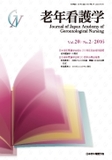Japanese
English
- 販売していません
- Abstract 文献概要
- 参考文献 Reference
抄録
経管栄養を受ける高齢者の排便の実態と下痢症状に関連する要因を明らかにすることを目的に,療養病床に入院中で経管栄養を開始して6か月以上経過している高齢者140人を対象に調査を実施した.下痢症状が認められる者は,113人(80.7%)で,便失禁している者が138人(98.6%)であった.下痢症状と有意な関連が認められた項目は,座位保持能力,栄養剤の形態,液状栄養剤使用者の1時間当たりの注入量であった.下痢症状のある者は,そうでない者に比べて1時間当たりの注入量が少なく,注入速度をゆっくりにすることによる下痢症状の改善がむずかしいことが推察された.また,下痢していない者は,半固形栄養剤の使用者が多かったことから,下痢症状の改善に半固形栄養剤を用いることが有効であることが確認された.さらに,下痢症状は,座位保持能力が低いこととの関連が認められ,身体機能が排便に影響していることが示唆された.
The objective of the current study was to elucidate the defecation status and the factors relating to diarrhea in elderly patients receiving tube feeding. We conducted a survey on a total of 140 elderly individuals hospitalized in a recuperation ward who had been receiving tube feeding for ≥6 months. A total of 113 patients (80.7%) had diarrhea and 138 (98.6%) had fecal incontinence. Items significantly related to diarrhea were the ability to maintain a seated position, form of nutritional supplements, and infusion volume per hour in patients receiving liquid-form nutritional supplements. Patients with diarrhea had a lower infusion volume per hour than those who did not have diarrhea, indicating that it would be difficult to treat diarrhea by reducing the infusion rate. In addition, many of the patients who did not have diarrhea were receiving semi-solid nutritional supplements, confirming that use of semi-solid nutritional supplements is effective in treating diarrhea. Furthermore, diarrhea was associated with an inability to maintain a seated position, suggesting that physical function is an important factor affecting defecation.
Copyright © 2016, Japan Academy of Gerontological Nursing All rights reserved.


